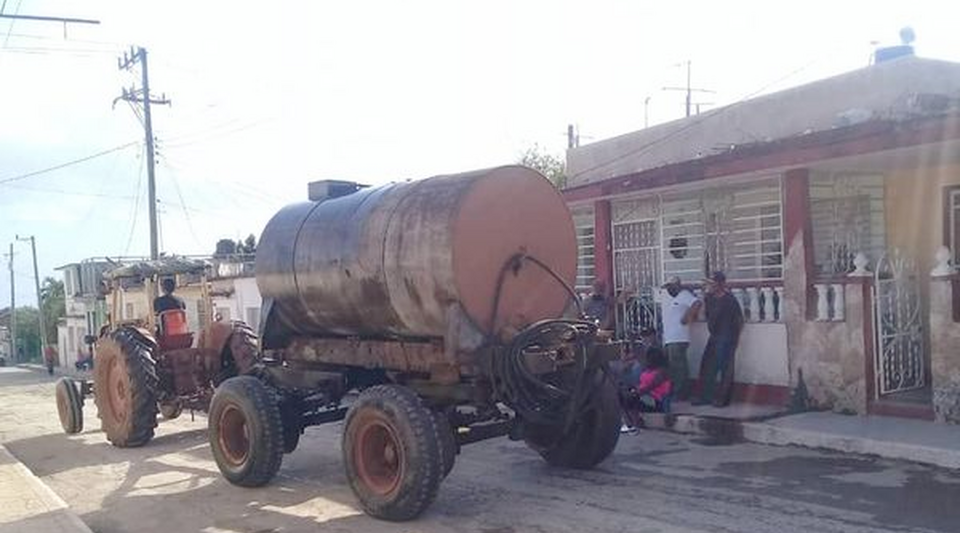Retired engineer, María de los Ángeles Alfonso cannot find an answer to the question that torments her: When is the water supply problem going to be solved in San Antonio de los Baños? Seven months later, in the municipality of Artemisa where the protests broke out on July 11, the neighbors are still carrying buckets.
“My daily routine has totally changed because of this. Sometimes you have to wake up at dawn because a trickle of water arrives,” he details. “Here the people have a total disgust, especially the women”, because they are the ones who mainly take care of the laundry, the preparation of food and the cleaning in the homes.
“There are work centers, including Public Health, where managers have had to tell their workers that they can go home to wash and clean as soon as they find out that the water has arrived in their neighborhood,” Alfonso tells 14ymedio. “Even people who never make critical comments in public are already raising their voices”
“My son has not been able to go to school for three days because not a single drop has entered here to wash his uniform, and all the other clothes are also dirty”
Facebook has become, for the neighbors, a place to let off steam, but there they also found out this Wednesday about the new schedule for the entry of water into the municipality. The Aqueduct Company published a schedule that increases supply cycles to five days and justifies the measure due to the “decrease in water levels in the Ariguanabo Basin.”
“My son has not been able to go to school for three days because not a single drop has entered here to wash his uniform, and all the other clothes are also dirty,” Ezequiel Garrido, a resident near the service center, told this newspaper. . “As adults we tighten our belts, but this situation with children in the house breaks the soul.”
Garrido has decided to sell his home and move to any municipality on the outskirts of Havana. “I put the ad up months ago and, although the price is low, everyone who calls me interested in the house asks me about the water issue because this is already a bad handwriting what we have. Nobody wants to come and live here”
Others choose to emigrate. “It is an avalanche of people who have left this town via Mexico, the Darién jungle or any other route”
Others choose to emigrate. “It is an avalanche of people who have left this town via Mexico, the Darién jungle or any other route,” laments María de los Ángeles Alfonso. “We have even lost doctors because the situation in general is very difficult and much more so in the hospital.” In San Antonio “we even have plague in our souls”.
Through the municipality passes the Ariguanabo River, about 14 kilometers long. Traditionally, the area’s water supply has been supplied from its basin, especially springs and wells, but drought, industrial waste and overexploitation have severely damaged its flow.
The retiree attributes the ecological disaster that now prevents them from getting supplies from the river and springs in the area to malpractice. “The river is not cleaned, the springs are not protected,” he details. The deterioration of the aqueduct network, which began to be built in 1894, also contributes to the current situation.
Two years ago, this newspaper reported the problems of the municipality with the arrival of water
Now, the authorities undertake a remodeling of the entire hydraulic system and promise that in 60 days San Antonio will be connected to new sources of supply. “No one has been able to tell me what day one was, and they are working with very obsolete machinery,” laments Alfonso, who argues from his experience as an engineer.
Two years ago, this newspaper reported the problems of the municipality with the arrival of the water. “Now we can change even our name because there is nothing left of ‘bathrooms’,” an employee of the Las Yagrumas hotel joked then. “In my family we have an elderly bedridden woman and in all these days we have only received 20 liters of water for her to be able to wash her.”
When consulted now, the woman feels that no progress has been made in solving the problem, rather “everything is worse”. “This has become something chronic and the children in my family don’t know what it’s like to take a shower. Here everyone has to bathe with a little jug and in a basin and then use that water to clean the house.” “.
Agriculture is also hit hard by the drought. Vegetables and vegetables are scarce in the markets and in the offers of private forklift operators
Agriculture is also hit hard by the drought. Vegetables and vegetables are scarce in the markets and in the offers of private forklift operators. “It seems incredible that this is a town surrounded by farms and fertile land, here the onion is as expensive as in Havana,” denounces the employee.
On July 11, the lack of water, the conditions of the local hospital and the absence of oxygen for covid-19 patients pushed popular outrage to the limit. The demonstration was spurred by the situation of “a town that is in ruins, its cinema is in ruins, emblematic buildings such as the Spanish Casino, the Circle of Artisans and La Quintica”, María de los Ángeles Alfonso is indignant.
That day among those who protested “there were many more women than men,” recalls the retiree. “We are the most affected.”
________________________
Collaborate with our work:
The team of 14ymedio is committed to doing serious journalism that reflects the reality of deep Cuba. Thank you for joining us on this long road. We invite you to continue supporting us, but this time becoming a member of our journal. Together we can continue transforming journalism in Cuba.














